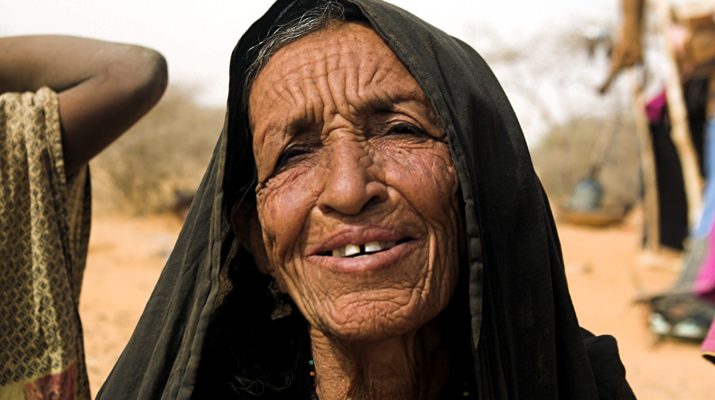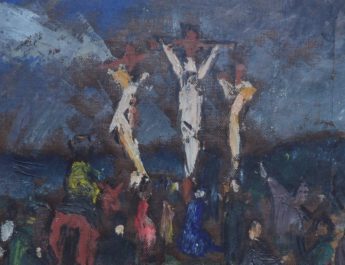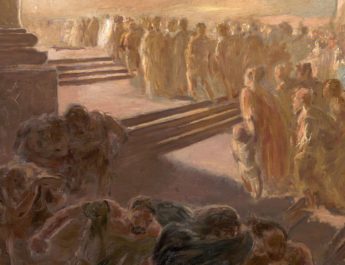Genesis 18:1-15 & 21:1-7
NL 202
BibleHub
18:1 The LordI appearedII to Abraham by the oaksIII of Mamre,IV
Notes on verse 18:1a
I “Lord” = YHVH. From havah (to be, become) or hayah (to come to pass, become, be). This is the name of the God of Israel, the self-existent and eternal one, the tetragrammaton. This pronunciation has been lost to time so “Lord” is generally used in its place.
II “appeared” = raah. This is to see in a literal or figurative sense so stare, advise, think, view.
III “oaks” = elon. 10x in OT. From ayil (strength; things that are strong or powerful: political chiefs, rams, posts, trees, oaks); from the same as ul (mighty, strength, body, belly; root may mean to twist and that implies strength and power). This is terebinth, oak, or another kind of tree that is strong.
IV “Mamre” = Mamre. 10x in OT. Perhaps from mara (to rebel, flap wings, whip, be filthy). This is Mamre a personal name and a place name. It may mean vigor or lusty.
as he satV at the entranceVI of his tentVII in the heatVIII of the day.IX
Notes on verse 18:1b
V “sat” = yashab. This is to sit and so to remain and so to dwell. It is sitting for any reason – as a judge, in order to ambush, or just sitting quietly. Causatively, this can mean settling or marrying. This can also mean continue, endure, or establish.
VI “entrance” = petach. From patach (to open wide in a literal or figurative sense, loosen, plow, carve). This is opening, door, gate, entrance.
VII “tent” = ohel. Perhaps from ahal (to shine, be clear). This is a tent, covering, home, or side pillar.
VIII “heat” = chom. 14x in OT. From chamam (to be warm, heat; to be hot in a literal or figurative sense; to mate). This is hot or warmth.
IX “day” = yom. Root may mean being hot. This is the day in a literal or figurative sense. It can also mean birth, age, daylight, continually or other references to time.
2 He looked upX and sawXI, XII threeXIII menXIV
Notes on verse 18:2a
X “looked up” = nasa + ayin. Literally, “lifted his eyes.” Nasa is to lift in a broad sense, literally and figuratively. So it could be to carry, take, or arise. It could also be bring forth, advance, accept. Ayin is eye in a literal or figurative sense so eye, appearance, favor, or a fountain (the eye of the landscape).
XI “saw” = raah. Same as “appeared” in v18:1. See note II above.
XII {untranslated} = hinneh. From hen (lo! Behold! If, though; an expression of surprise). This is to draw attention, show suddenness or surprise, or to emphasize the importance of the coming statement. See! Lo! Behold!
XIII “three” = shalosh. This is three, fork, three times.
XIV “men” = ish. Perhaps from enosh (human, humankind, mortal); from anash (to be weak, sick, or frail). This is man, husband, another, or humankind.
standingXV near him. When he saw them, he ranXVI from the tent entrance to meetXVII them and bowed downXVIII to the ground.XIX
Notes on verse 18:2b
XV “standing” = natsab. This is to station, appoint, establish, take a stand.
XVI “ran” = ruts. This is to run or rush, divide quickly, bring swiftly. It can also refer to a footman or guard.
XVII “meet” = qirah. From the same as qara (to happen, meet, bring about). This is any kind of encounter, whether peaceful, hostile, or incidental. It can also mean help or seek.
XVIII “bowed down” = shachah. This is to bow down, make a humble entreaty, to do homage to royalty or to God.
XIX “ground” = erets. Root may mean to be firm. This is earth, ground, field land, or country.
3 He said, “My lord,XX ifXXI I findXXII favorXXIII
Notes on verse 18:3a
XX “lord” = adon. From a root that means ruling or being sovereign. This is lord, master, or owner.
XXI {untranslated} = na. This particle is used for requests or for urging. It can be we pray, now, I ask you, oh. This is the same “na” in “hosanna.”
XXII “find” = matsa. This is to find, catch or acquire. It can also mean to come forth or appear. Figuratively, this can mean to meet or be together with.
XXIII “favor” = chen. From chanan (beseech, show favor, be gracious; properly, to bend in kindness to someone with less status). This is grace, favor, kindness, beauty, precious.
with you,XXIV do notXXV passXXVI by your servant.XXVII
Notes on verse 18:3b
XXIV “you” = ayin. Same as “looked up” in v18:2. See note X above.
XXV {untranslated} = na. Same as {untranslated} in v18:3. See note XXI above.
XXVI “pass” = abar. This is to pass over or cross over. It is used for transitions, whether literal or figurative. It can also mean to escape, alienate, or fail. This is the root verb from which “Hebrew” is drawn.
XXVII “servant” = ebed. From abad (to work, serve, compel; any kind of work; used causatively, can mean to enslave or keep in bondage). This is a servant, slave, or bondservant.
4 Let a littleXXVIII waterXXIX be brought,XXX, XXXI
Notes on verse 18:4a
XXVIII “little” = me’at. From ma’at (being or becoming small, decrease, diminish, pare off). This is a little or few, lightly little while, very small matter.
XXIX “water” = mayim. This is water, waters, or waterway in a general sense. Figuratively, it can also mean juice, urine, or semen.
XXX “brought” = laqach. This is to take, accept, carry away, receive. It can also have the sense of take a wife or take in marriage.
XXXI {untranslated} = na. Same as {untranslated} in v18:3. See note XXI above.
and washXXXII your feet,XXXIII and restXXXIV yourselves underXXXV the tree.XXXVI
Notes on verse 18:4b
XXXII “wash” = rachats. This is to wash, wash away – it can be complete or partial.
XXXIII “feet” = regel. This is foot, endurance, or journey. It is a foot as the means of walking and so it implies a step or a greater journey. It can be used euphemistically for private parts.
XXXIV “rest” = shaan. This is to lean or support oneself. So, it can mean to rely or trust.
XXXV “under” = tachat. This is underneath, below, the bottom, instead of.
XXXVI “tree” = ets. Perhaps from atsah (to shut, fasten, firm up, to close one’s eyes). This is tree or other things related to trees like wood, sticks, or stalks. It can also refer to wood products like a plank or staff or gallows. Additionally, this can refer to a carpenter.
5 Let me bring a littleXXXVII bread,XXXVIII that you may refreshXXXIX yourselves,XL
Notes on verse 18:5a
XXXVII “little” = path. 15x in OT. From pathath (to crumble, open, break). This is a piece, morsel, or fragment.
XXXVIII “bread” = lechem. From lacham (to eat, feed on). This is bread, food, loaf. It can refer to food more generally for people or for animals.
XXXIX “refresh” = saad. 12x in OT. This is to support, uphold, or sustain. It can mean refresh or comfort.
XL “yourselves” = leb. May be related to labab (to encourage; properly, to be encased as with fat; used in a good sense, this means to transport someone with love; used in a bad sense, it can mean to dull one’s senses). This is the heart, courage, one’s inner self, the mind, or the will. Heart is only used in a figurative sense in the Old and New Testaments.
and afterXLI that you may pass on—sinceXLII you have comeXLIII to your servant.”
So they said, “XLIVDoXLV as you have said.”XLVI
Notes on verse 18:5b
XLI “after” = achar. From achar (to remain behind, linger, continue, be behind, or delay; can also imply procrastination). This is after or the last part, following.
XLII “since” = ken. Perhaps from kun (properly, in a perpendicular position; literally, to establish, fix, fasten, prepare; figuratively, it is certainty, to be firm, faithfulness, render sure or prosperous). This is to set upright. Generally used figuratively to mean thus, so, afterwards, rightly so.
XLIII “come” = abar. Same as “pass” in v18:3. See note XXVI above.
XLIV {untranslated} = ken. Same as “since” in v18:5. See note XLII above.
XLV “do” = asah. This is to make, do, act, appoint, become in many senses.
XLVI “said” = dabar. This is generally to speak, answer, declare, or command. It might mean to arrange and so to speak in a figurative sense as arranging words.
6 And AbrahamXLVII hastenedXLVIII into the tent to SarahXLIX
Notes on verse 18:6a
XLVII “Abraham” = Abraham. From the same as Abiram (exalted father, a high father – lofty) {from ab (father literal or figurative) + rum (rise, bring up, being high, extol, exalt, haughty; to raise in a literal or figurative sense)}. This is Abraham, father of many nations or father of a multitude.
XLVIII “hastened” = mahar. This is being liquid, which implies flowing. So, this word implies hurrying forward, whether in a positive or negative sense.
XLIX “Sarah” = Sarah. From the same as Saray (princess, mistress, noble lady, queen); from sar (chief, ruler, captain, official, prince). This is Sarah, meaning princess.
and said, “Make ready quicklyL three measuresLI of choiceLII flour,LIII kneadLIV it, and makeLV cakes.”LVI
Notes on verse 18:6b
L “quickly” = mahar. Same as “hastened” in v18:6. See note XLVIII above.
LI “measures” = seah. 9x in OT. This is a seah, used to measure flour or grain – about 7 quarts.
LII “choice” = soleth. It may come from a word that means to strip. This is fine flour.
LIII “flour” = qemach. 15x in OT. Root perhaps meaning to grind. This is something ground, such as flour, meal, or grain.
LIV “knead” = lush. 5x in OT. This is to knead.
LV “make” = asah. Same as “do” in v18:5. See note XLV above.
LVI “cakes” = uggah. 7x in OT. Perhaps from ug (to gyrate, bake; baking a round cake). This is a bread cake that is round, cooked on the hearth.
7 Abraham ran to the herdLVII and tookLVIII a calf,LIX
Notes on verse 18:7a
LVII “herd” = baqar. From baqar (to plow, break forth; figuratively, to inquire, inspect, consider). This is cattle – an animal used for plowing.
LVIII “took” = laqach. Same as “brought” in v18:4. See note XXX above.
LIX “calf” = ben + baqar. Ben is from banah (to build or obtain children). This is son, age, child. It is son in a literal or figurative sense. Baqar is the same as “herd” in v18:7. See note LVII above.
tenderLX and good,LXI and gaveLXII it to the servant,LXIII who hastened to prepareLXIV it.
Notes on verse 18:7b
LX “tender” = rak. 16x in OT. From rakak (to be tender, soft, faint, weak; to soften or mollify). This is tender in a literal or figurative sense. It could be delicate, gentle, inexperienced, refined, soft, or weak.
LXI “good” = tob. From tob (to be pleasing, to be good). This is good, beautiful, pleasant, agreeable, bountiful, at ease. This word is used for goodness as a concept, a good thing, a good person. This can refer to prosperity and welfare as well as joy, kindness, sweetness, and graciousness. So, this is ethically good, but also enjoyably good.
LXII “gave” = natan. This is to give, put, set, offer. It is to give literally or figuratively.
LXIII “servant” = naar. May be from na’ar (to shake, toss up and down, tumble around). This is a child or a servant. It is a child in their active years so they could be aged anywhere from infancy to adolescence.
LXIV “prepare” = asah. Same as “do” in v18:5. See note XLV above.
8 Then he took curdsLXV and milkLXVI and the calf that he had prepared and setLXVII it
Notes on verse 18:8a
LXV “curds” = chemah. 10x in OT. Perhaps from the same as chomah (a wall for protection); from the same as cham (father-in-law – one’s husband’s father; perhaps from a root meaning to join). This is milk products like curds, butter, or cheese.
LXVI “milk” = chalab. Perhaps from the same as cheleb (fat, finest, marrow; fat in a literal or figurative sense; the richest or best part). This is milk or cheese or suckling.
LXVII “set” = natan. Same as “gave” in v18:7. See note LXII above.
beforeLXVIII them, and he stoodLXIX by them under the tree while they ate.LXX
9 They said to him, “Where is your wifeLXXI Sarah?”
And he said, “There,LXXII in the tent.”
Notes on verses 18:8b-9
LXVIII “before” = paneh. From panah (to turn, face, appear). This is face in a literal or figurative sense. It could be face, presence, anger, respect. It can also be used of God to indicate divine favor or presence.
LXIX “stood” = amad. This is to stand up in a literal or figurative sense. So it can be establish, continue, endure, take a stand, act, be a servant, stand still, remain, stand against an enemy.
LXX “ate” = akal. This is to eat, devour, burn up, or otherwise consume. It can be eating in a literal or figurative sense.
LXXI “wife” = ishshah. Related to “men” in v18:2. From ish (see note XIV above). This is woman, wife, or female.
LXXII “there” = hinneh. Same as {untranslated} in v18:2. See note XII above.
10 Then one said, “I will surely returnLXXIII to you in dueLXXIV season,LXXV
Notes on verse 18:10a
LXXIII “surely return” = shub + shub. To turn back, return, turn away – literally or figuratively. Doesn’t necessarily imply going back to where you started from. This is also the root verb for the Hebrew word for repentance “teshubah.” The word is repeated twice – the first time as an Infinitive Absolute. The Infinitive Absolute serves to emphasize the sentiment of the word. It is rather like Foghorn Leghorn’s speech pattern, “I said, I said.”
LXXIV “due” = chay. From chayah (to live or keep alive literally or figuratively). This is alive, living, lifetime. It can also be used to describe someone’s age. It can refer to animals, plants, water, or a company or congregation of people. It is life in a very broad sense.
LXXV “season” = et. Probably from anah (to answer, sing, announce); from ad (forever, all, old); from adah (to pass on, advance, decorate oneself). This is a period or season. It can also mean whenever or continually.
andLXXVI your wife Sarah shall have a son.”LXXVII And Sarah was listeningLXXVIII at the tent entrance behindLXXIX him.
Notes on verse 18:10b
LXXVI {untranslated} = hinneh. Same as {untranslated} in v18:2. See note XII above.
LXXVII “son” = ben. Same as “calf” in v18:7. See note LIX above.
LXXVIII “listening” = shama. This is to hear, call, consent, or consider. It implies listening intelligently, giving attention, and, because of these two factors, obedience and action are often implied.
LXXIX “behind” = achar. Same as “after” in v18:5. See note XLI above.
11 Now Abraham and Sarah were old,LXXX advancedLXXXI in age;LXXXII it had ceasedLXXXIII to beLXXXIV with Sarah after the mannerLXXXV of women.LXXXVI
Notes on verse 18:11
LXXX “old” = zaqen. From the same as zaqan (beard or chin – the beard represents old age). This is old, aged, or elder.
LXXXI “advanced” = bo. This is to enter, come in, advance, fulfill, bring offerings, enter to worship, attack. It can also have a sexual connotation.
LXXXII “age” = yom. Same as “day” in v18:1. See note IX above.
LXXXIII “ceased” = chadal. This is properly to be flabby – it implies, to stop, fall, end, rest, leave alone, forsake, or desist. Figuratively this can be lacking or idle.
LXXXIV “be” = hayah. Related to “Lord” in v18:1. See note I above.
LXXXV “manner” = orach. From arach (to go, travel, wander). This is a road that is widely used, highway, caravan, traveler, troop.
LXXXVI “women” = ishshah. Same as “wife” in v18:9. See note LXXI above.
12 So Sarah laughedLXXXVII to herself,LXXXVIII saying, “After I have grown old,LXXXIX and my husbandXC is old,XCI shall I be fruitful?”XCII
Notes on verse 18:12
LXXXVII “laughed” = tsachaq. 13x in OT. This is to laugh, mock, play, make sport. It is laughing out loud whether in joy or in a scornful way. This is the root of “Isaac.”
LXXXVIII “to herself” = qereb. Perhaps from qarab (to come near or approach). This is among, in the midst, before, the center It is the inward part, whether literal or figurative. It can also be used for the heart, the site of thoughts and feelings. This word is also used as a technical term for the entrails of the animals who are sacrificed.
LXXXIX “grown old” = balah. 17x in OT. This is to grow old, wear out, consume, waste, enjoy, fail, decay.
XC “husband” = adon. Same as “lord” in v18:3. See note XX above.
XCI “is old” = zaqen. Related to “old” in v18:11. From the same as zaqan (see note LXXX above). This is to be old or grow old.
XCII “fruitful” = eden. 5x in OT. From adan (to luxuriate, revel; also, to be pleasant or soft). This is delicate, luxury, or a delight.
13 The LordXCIII said to Abraham, “Why did Sarah laugh and say, ‘Shall I indeedXCIV bearXCV a child, now that I am old?’
Notes on verse 18:13
XCIII “Lord” = YHVH. Same as “Lord” in v18:1. See note I above.
XCIV “indeed” = aph + umnam. Aph is also, furthermore, even. Umnam is 5x in OT. From aman (to believe, endure, fulfill, confirm, support, be faithful, put one’s trust in, be steadfast; figuratively, to be firm, steadfast, or faithful, trusting, believing, being permanent, morally solid) OR from omnam (indeed, truly, no doubt); {from aman (see above)} OR from omen (faithfulness, truth); {from aman (see above)}. This is truly, really, or indeed. It shares a root with the word “amen.”
XCV “bear” = yalad. This is to bear or bring forth. It can mean to act as midwife or to show one’s lineage. This is often used for birth or begetting.
14 Is anythingXCVI too wonderfulXCVII for the Lord?XCVIII At the set timeXCIX I will return to you, in due season, and Sarah shall have a son.”
Notes on verse 18:14
XCVI “anything” = dabar. Related to “said” in v18:5. From dabar (see note XLVI above). This is speech, a word, a matter, an affair, charge, command, message, promise, purpose, report, request. It is a word, which implies things that are spoken of in a wide sense.
XCVII “too wonderful” = pala. From pele (wonder, miracle, wonderful, marvelous thing). This is to be extraordinary, to arise, to be great or accomplish.
XCVIII “Lord” = YHVH. Same as “Lord” in v18:1. See note I above.
XCIX “set time” = moed. From yaad (to appoint, assemble or gather selves, agree). This is a meeting, assembly, fixed time. It can be used for a festival or feast. It can also refer to a meeting place.
15 But Sarah denied,C saying, “I did not laugh,” for she was afraid.CI
He said, “Yes,CII you did laugh.”
Notes on verse 18:15
C “denied” = kachash. This is deceive, fail, or deny. It can be lying or disappointing. It can also mean becoming lean or cringe.
CI “was afraid” = yare. This is to fear, be afraid, dreadful. It can also refer to fearful reverence – to fear in a moral sense is to say to revere, respect.
CII “yes” = lo. Literally, “no.”
21:1 The LordCIII dealtCIV with Sarah as he had said, and the LordCV did for Sarah as he had promised.CVI
Notes on verse 21:1
CIII “Lord” = YHVH. Same as “Lord” in v18:1. See note I above.
CIV “dealt” = paqad. This is to attend to or visit – can be used for a friendly or violent encounter. So, it can be to oversee, care for, avenge, or charge.
CV “Lord” = YHVH. Same as “Lord” in v18:1. See note I above.
CVI “promised” = dabar. Same as “said” in v18:5. See note XLVI above.
2 Sarah conceivedCVII and bore Abraham a son in his old age,CVIII at the timeCIX of which GodCX had spokenCXI to him.
Notes on verse 21:2
CVII “conceived” = harah. This is to conceive or be pregnant – it can be literal or figurative.
CVIII “old age” = zaqun. Related to “old” in v18:11 & “is old” in v18:12. 4x in OT– all in Genesis. From zaqen (see note XCI above); from the same as zaqan (beard or chin – the beard represents old age). This is old age.
CIX “time” = moed. Same as “set time” in v18:14. See note XCIX above.
CX “God” = Elohim.
CXI “spoken” = dabar. Same as “said” in v18:5. See note XLVI above.
3 Abraham gaveCXII the nameCXIII IsaacCXIV to his sonCXV whom Sarah bore him.
Notes on verse 21:3
CXII “gave” = qara. This is to call or call out – to call someone by name. Also used more broadly for calling forth.
CXIII “name” = shem. May be from sum (to put, place, set). This is name, fame, renown. A name was thought to indicate something essential about a person – something about their individuality. So, this word can also mean honor, authority, or character.
CXIV “Isaac” = Yitschaq. Related to “laughed” in v18:12. From tsachaq (see note LXXXVII above). This is Isaac, meaning “he laughs.”
CXV {untranslated} = yalad. Literally, “who was born to him.” Same as “bear” in v18:13. See note XCV above.
4 And Abraham circumcisedCXVI his son Isaac when he was eightCXVII days old,CXVIII as God had commandedCXIX him. 5 Abraham was a hundredCXX yearsCXXI old when his son Isaac was born to him.
Notes on verses 21:4-5
CXVI “circumcised” = mul. This is to cut off, cut in pieces, or destroy. It is used for to circumcise. It can also mean to blunt.
CXVII “eight” = shemoneh. Perhaps from shamen (to shine, which implies being oily, growing fat); from shaman (to grow fat, shine, be oily). This is eight or eighth. It can refer to abundance as being more than 7, the number of sacred fullness.
CXVIII “old” = ben. Same as “calf” in v18:7. See note LIX above.
CXIX “commanded” = tsavah. This is to charge, command, order, appoint, or enjoin. This is the root that the Hebrew word for “commandment” comes from (mitsvah).
CXX “hundred” = meah. This is hundred or some number times one hundred (i.e. hundredfold or the base of two hundred, three hundred, etc.).
CXXI “years” = shanah. From shana (to change, alter). This is a year, age, old. It can also mean yearly.
6 Now Sarah said, “God has broughtCXXII laughterCXXIII for me; everyoneCXXIV who hearsCXXV will laugh with me.”
7 And she said, “Who would ever have saidCXXVI to Abraham that Sarah would nurseCXXVII children?CXXVIII Yet I have borne him a son in his old age.”
Notes on verses 21:6-7
CXXII “brought” = asah. Same as “do” in v18:5. See note XLV above.
CXXIII “laughter” = tsechoq. Related to “laughed” in v18:12 & “Isaac” in v21:3. 2x in OT. From tsachaq (see note LXXXVII above). This is laughter from joy or scorn.
CXXIV “everyone” = kol. From kalal (to complete). This is all or every.
CXXV “hears” = shama. Same as “listening” in v18:10. See note LXXVIII above.
CXXVI “said” = malal. 5x in OT. This is to say or speak.
CXXVII “nurse” = yanaq. This is to suckle or to nurse. In a causative sense, it can mean to give milk. So, this word can be used for a nursing mother or for her suckling child.
CXXVIII “children” = ben. Same as “calf” in v18:7. See note LIX above.
Image credit: “the face” by Emilia Tjernström, 2007.




